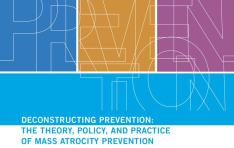Tuesday, February 26, 2013
9 a.m. – 6:15 p.m.
Jacob Burns Moot Court Room
Benjamin N. Cardozo School of Law
55 Fifth Avenue, New York, NY 10003
Over the past decade, the prevention agenda has expanded to include conflict prevention, protection of civilians, genocide prevention, atrocity prevention, transitional justice, and the Responsibility to Protect. While this expansion is welcome, it does not come without its challenges. The rapid growth in policy response and civil society advocacy has left little time for critique and self-reflection. The prevention field’s underlying assumptions and goals have remained for the most part under-examined and under-theorized. This conference seeks to reveal an understanding of atrocity prevention, defining its parameters and rationalizing its relationship to related disciplines and agendas. It will result in an edited volume serving as an authoritative work on the state of the field of prevention.
The conference is free and open to the public, but please RSVP to dmitzner@auschwitzinstitute.org, or call 212.575.2605. Please indicate whether you are applying for CLE credits. Cardozo Law is a New York State CLE provider. Seven credit hours approved.
Panelists and speakers subject to change.
9:00 a.m. Keynote Speaker: Lt. Gen. (ret) Roméo Dallaire, Canadian Senator
10:00 a.m. The United Nations Office on the Prevention of Genocide and the Responsibility to Protect: An Evolving Institution
Moderated by Gillian Kitley, Senior Officer, UN Office on the Prevention of Genocide and the Responsibility to Protect
Ambassador Francis Deng, Permanent Representative of South Sudan to the United Nations; Special Adviser to the UN Secretary-General on the Prevention of Genocide
Edward Luck, Dean, University of San Diego School of Peace Studies; Special Adviser to the UN Secretary-General on R2P
Juan E. Méndez, Visiting Professor of Law, American University – Washington College of Law; UN Special Rapporteur on Torture and other Cruel, Inhuman, and Degrading Treatment of Punishment; Special Adviser to the UN Secretary-General on the Prevention of Genocide
11:45 a.m. Transitional Justice and Genocide Prevention
Moderated by Naomi Kikoler, Director of Policy and Advocacy, Global Centre for the Responsibility to Protect
Elazar Barkan, Professor of International and Public Affairs and Director, Institute for the Study of Human Rights, Columbia University
Pablo De Greiff, UN Special Rapporteur on the Promotion of Truth, Justice, Reparation, and Guarantees of Non-recurrence of Serious Crimes and Gross Violations of Human Rights
Fabián Oddone, Chief of Section, Foreign Policy, Defense and Security Section, Embassy to Brazil, Ministry of Foreign Affairs, Argentina
Sheri Rosenberg, Professor of Law, Benjamin N. Cardozo School of Law
1:30 p.m. Lunch
Barbara Harff, Professor of Political Science Emerita, U.S. Naval Academy; Visiting Scholar, Department of Political Science, University of Nevada, Las Vegas, receives the Raphael Lemkin Prize from the Auschwitz Institute, in recognition of her outstanding contribution to the cause of genocide prevention.
3:00 p.m. Crisis Mapping, Technology, and Genocide Prevention
Moderated by Shashi Kara, Program Consultant, Program in Holocaust and Human Rights Studies, Benjamin N. Cardozo School of Law
Jennifer Leaning, Francois-Xavier Bagnoud Professor of the Practice of Health and Human Rights, Harvard School of Public Health; Associate Professor of Medicine, Harvard Medical School; Director, FXB Center for Health and Human Rights, Harvard University
Colette Mazzucelli, Associate Adjunct Professor, Center for Global Affairs, New York University; Chair, Academic Advisory Council
Zach Romanow, Philanthropic Engineer, Palantir Technologies
4:45 p.m. Organizing Government to Prevent Genocide
Moderated by Tibi Galis, Executive Director, Auschwitz Institute
Victoria Holt, Deputy Assistant Secretary, Bureau of International Organization Affairs, U.S. Department of State
Onyinye Onwuka, Program Officer, Early Warning Directorate, ECOWAS Commission, Nigeria
Ramiro Riera, Program Director, National Department of Human Rights and International Humanitarian Law, Ministry of Defense, Argentina
Beth Van Schaack, Deputy to the Ambassador-at-Large for War Crimes Issues, Office of Global Criminal Justice, U.S. Department of State
Conference partners: Carnegie Council for Ethics in International Affairs, Institute for the Study of Genocide, Heinrich Böll Stiftung North America
